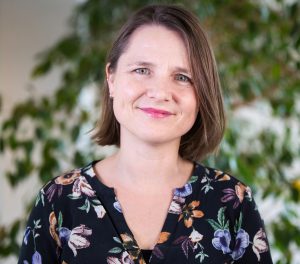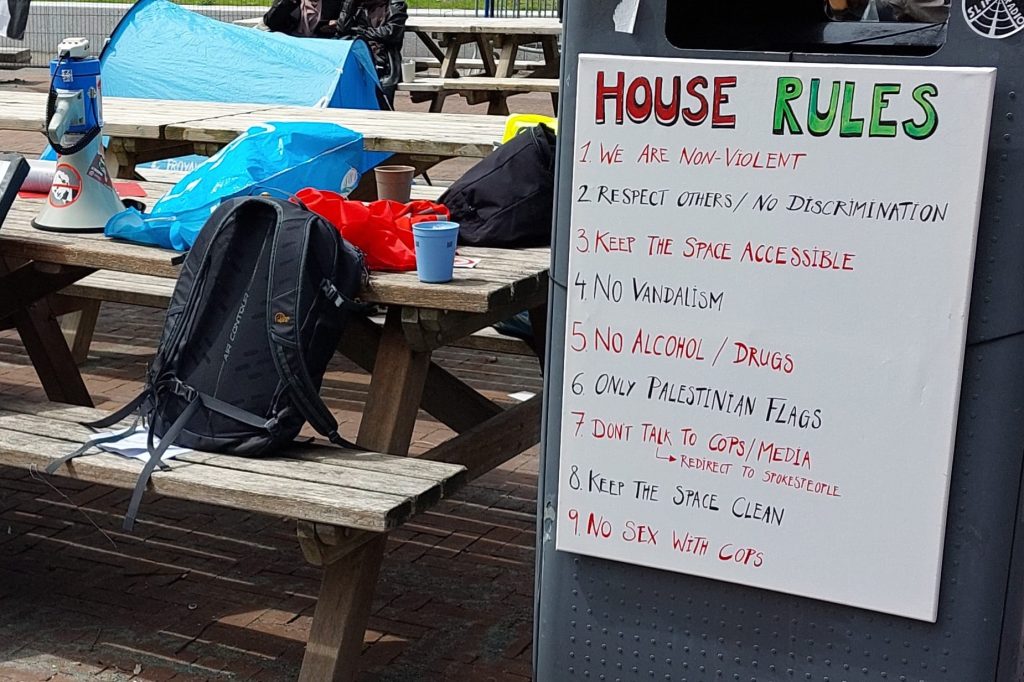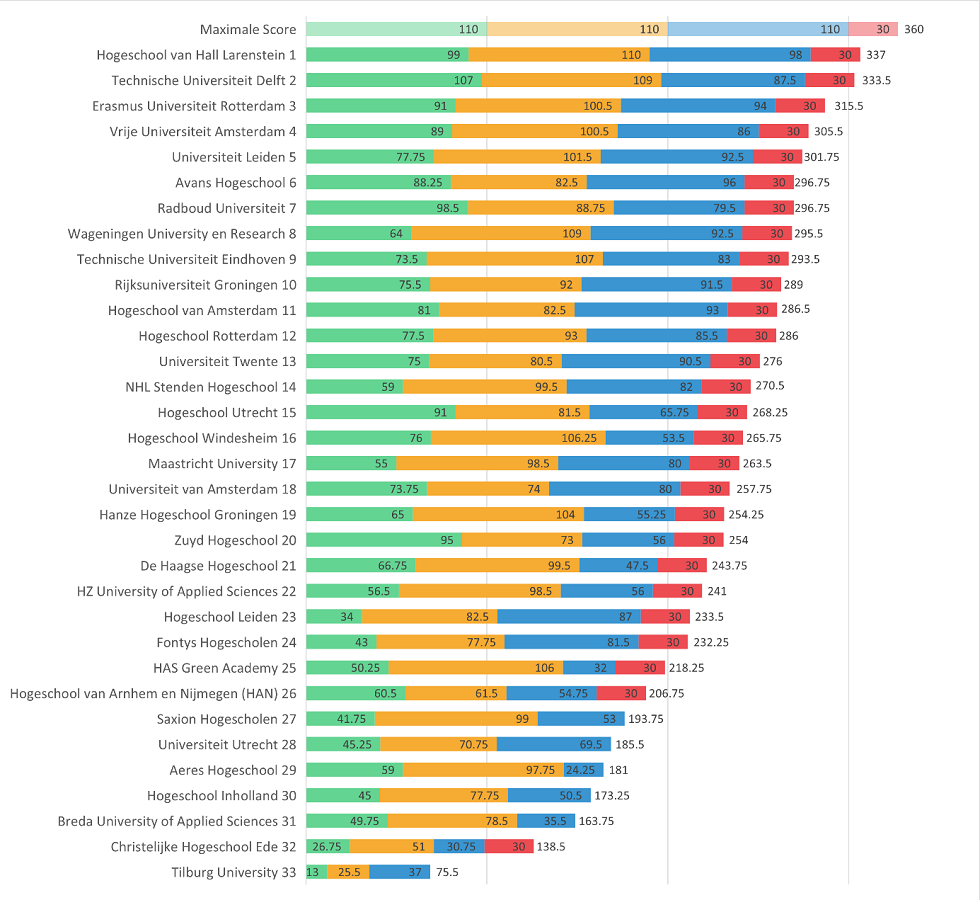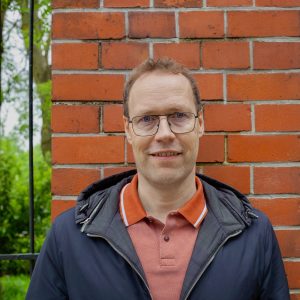Sorry...
Your search on '' returned no results.
It was a tumultuous year for leaders of the student movement. Suddenly the government fell and it was all hands on deck for ISO and LSVb. And out of nowhere, the fine for slow students made a comeback. “It turned students’ worlds upside down.”
Both of them have now passed the baton: Demi Janssen (Dutch National Students’ Association, ISO) and Elisa Weehuizen (Dutch Student Union, LSVb). For Weehuizen, this was two days ago, whereas Janssen has already been to Tenerife “to spend a week doing nothing”.
This is the quietest they’ve had it for a long time. “I remember I was busy trying to make my final study deadline last year when the news came in that the government had fallen”, says Janssen. “Needless to say, my phone was ringing off the hook right away because we immediately had to get to work: what will this mean for students?”
They had to talk to political parties as quickly as possible: what were they going to put in their election programmes? How could they draw attention to topics relevant to students? “We suddenly boarded a rollercoaster and had to prepare ourselves for an entirely different political year”, says Weehuizen. “That does require some flexibility.”
Amongst other things, they called for internship allowances, flexible studying and student wellbeing. Janssen: “Those points made it into many programmes. But then you see the outline agreement and you couldn’t be more frustrated.”
The new government wants to fine slower students. They will have to pay three thousand euros extra in tuition fees if they take longer than one year extra to finish their Bachelor’s or Master’s degree.
Incidentally, they had not seen this coming. Janssen: “It’s exactly the parties that are now forming a coalition that said they attached so much importance to livelihood. And then you introduce a fine that makes life difficult for informal carers or students with a chronic illness, for instance! That doesn’t add up.”
“The fine turned students’ worlds upside down”, Weehuizen confirms. “From unions to social student associations, everyone is very worried.” The battle will cost a lot of time, she expects, and she thinks that’s a pity. “Now we have to focus on defensively fighting against those cutbacks and against the penalty for slow students, which takes a lot of time away from improving education. Our main priority at the moment is to make sure things don’t come crumbling down in the years to come.”
LSVb immediately organised a protest against this fine for slow students, in which all kinds of organisations and unions participated, including administrators of higher education institutions.
But ISO wasn’t there. It illustrates the difference between ISO and LSVb: one prefers to be at the consultation table, the other is activist in nature. “Perhaps we’re not as likely to be on a protest field”, says Janssen, “but we do voice our opinions very loudly nonetheless.” For example, ISO and LSVb joined forces with others to write an urgent letter about that fine for slow students.
 Demi Janssen in front of the camera of local news station L1
Demi Janssen in front of the camera of local news station L1
The difference between the two student organisations is also evident from their stance on the pro-Palestine protests. Weehuizen: “When those anti-genocide protests broke out, the student movement was in an uproar. Personally, I thought it was very cool that students could organise themselves so quickly. We expressed our support because we saw that some institutions didn’t actually want to have a dialogue and didn’t offer any transparency. So how can students create a counterweight? “For us, those protests are a symptom indicating things aren’t right with democracy in education.”
Janssen: “Above all, we thought it was important that students could voice their opinions and could have a dialogue. And we find it worrying that didn’t go well everywhere.” It’s not a good sign if the police are involved or if students feel the need to go on hunger strike, she believes. “Students need to feel heard by their institution, in a safe dialogue.”
What did they accomplish? For one thing, they reached agreement with the higher education institutions on national guidelines on the reimbursement of students on the participation councils.
Janssen: “It’s very important that the board takes account of the opinions of all students and not just the ones that can afford to spend a year on participation. You also need to hear the students who are less well-off.”
Those reimbursements are more than fair, LSVb thinks. “It’s work and that means you have to get paid. As an institution, you actually benefit from students being able to form a counterweight.”
Now they’re both going back to studying. Weehuizen studies sociology at Erasmus University Rotterdam and will spend five months of the final year of her Bachelor’s programme in Singapore. Janssen is continuing her liberal arts and sciences Bachelor’s in Maastricht.
Do they have any good advice for their successors? Janssen: “Realise you’re not alone. You have a team of representatives and staff around you, all of whom are very motivated. You also receive support from former student representatives. And do take a breather now and then. You do a lot for students, you have every right to be proud of that.”
Weehuizen: “As a student representative, be courageous! Accessibility of education is under pressure, now more than ever. This demands leadership that voices its opinions clearly and doesn’t flinch in the face of political headwind. Hold your ground and don’t forget to take good care of yourself.”
At 12.00 on Monday afternoon, activists at the encampment walk up to the front entrance of the main building carrying a big bag. The group quickly scatters the contents around: dolls, toys and clothes, with bright red colouring applied to them. “Our action today shows who the victims are of the actions of the Israeli state. Children being murdered en masse. These are their clothes”, yells one of the activists. The reason they are protesting at this particular moment is to support a delegation of their encampment negotiating with the VU executive board.
The main entrance of the university is quickly closed off. Those walking around the building to the campus square entrance are greeted with more closed doors. A security guard standing there says that there is a ‘lockdown’. He affirms that no one is able to go in or out at the moment and expects it to be over in a few minutes. Some people are able to get in through a side entrance upon showing their student or staff card. Those that want to leave the building can also exit through there.
The encampment has six demands, more elaborately described on their Instagram: 1. Suspend all existing collaborations with Israeli corporations and academic institutions until the university's human rights framework is in place. 2. If institutions are linked to systemic or gross violations of human rights, VU must sever ties with those institutions immediately. 3. Provide a concrete timeline for the development of the framework. 4. Disclose VU relationships and funding sources. 5. Reflect on and change VU guidelines on demonstration and peaceful protest. 6. Ensure the right of free expression of students and staff.
Around that time, a new statement on the VU website explains that the building is not accessible. A VU spokesperson says this decision was taken because of “safety considerations”. Meanwhile, lots of students and employees are confused and frustrated. A few of them grow upset with the protesters, leading to at least two heated exchanges. The activists consider it the university’s responsibility for closing the doors and see it as unnecessary. “We weren’t planning to go inside”, says Jay, spokesperson of the encampment. Last Friday on June 7 they did momentarily go inside and make some noise.
Despite the constant rain the activists chant, yell and dance full of energy. They write ‘Free Palestine’ on the tiles with sprayable chalk. After a while, when the initial group of roughly fifty people seems to have doubled, they paint the same on the entrance doors and tape a large Palestinian flag to the main entrance.
The protest disbands after an hour and forty-five minutes, shortly after they receive word that the negotiators came up empty-handed. At that time, the peace unit of the police also shows up to have a chat with the activists and see what’s going on. Some moments later the front entrance is reopened, the activists take their attributes with them and the slogans are washed off by university staff.
On Friday, the activists announced on their Instagram that the mayor of Amsterdam sent them a letter. According to their photos of the letter, the mayor had requested them to register their protest with the municipality. She also said she allows the encampment so long as certain conditions are met. The list of eight conditions includes that the activists remain in a specific designated area and ‘should not expand in a manner that creates an untenable and unsafe situation’. If the activists disagree with the decision, they are asked to respond within six weeks.
View this post on Instagram
‘The genocide supporting mayor thinks she has the right to dictate to us how and when we voice our support for Palestine. We have never – and will never – beg to have our voices heard’, the activists write on their Instagram. A follow-up letter, which Ad Valvas has received a screenshot of, indicates that Halsema considered actions during last Friday’s protest to be unacceptable. But because the situation had calmed down, the letter states that the municipality will not intervene. That will be reconsidered if more incidents occur. The letter states the length of the encampment is also a factor in that consideration. Ad Valvas continuously attempted to contact the municipality’s spokespeople and confirm the content of the letter, but they haven’t yet responded.
VU academics blog monthly about improving societal connectedness at advalvas.vu.nl/column-blog/
My daughter experiences school-related stress on a regularly basis. She often comes home telling me she had to work really hard, with almost no time for fun or games. The many tests and grades make her nervous. Of course, this type of stress is not uncommon and not necessarily a concern. However, my daughter is 10 years old. I find that far too young for the pressure and stress that she experiences at school. Why can’t learning be more fun? And why can’t schools focus more on children’s motivation and well-being, rather than on their grades? To find answers, we need to look beyond one single research discipline.

Many issues related to our children’s education are complex and rooted in different intertwined layers. In science, these layers are called levels and we distinguish between, for example, the individual, social and societal levels. Each individual child goes through a unique developmental trajectory during their school period. Their neurobiological developmental processes are strongly shaped by their social environment: interactions with peers, siblings, parents and teachers. Influences are also exerted at the macro level by teaching practices (school systems) and the dominant values and goals within a society (the sociopolitical context).
Let’s go back to the example of my daughter. I remember her starting primary school as a happy and confident little girl who was eager to learn. Over the years, we have seen her losing motivation for schoolwork and becoming more worried about her performance. And my daughter is not an isolated case, as the Dutch Health Behaviour in School-Aged Children (HBSC) study convincingly demonstrates. HBSC’s 2022 report shows a concerning tripling of experienced performance pressure among Dutch youth over the last two decades. This increased pressure is accompanied by mental health problems, especially in girls.
Because of the complex and multi-levelled nature of a child’s development during the school period, we need to connect research from different fields and traditions to get to a better understanding of wicked problems such as performance pressure.
Connecting neuroscience, education and society: why? To understand why many children feel more stressed about their performance than they enjoy learning, we need to understand the interplay between the development of their brains and minds, school practices and societal values.
During the entire school period, important developmental processes occur in a child’s brain, shaping their behaviour and learning mechanisms. At the same time, brain development is influenced by the inputs a child receives, often in interaction with others.
During this developmental interplay, certain children maintain their intrinsic motivation to learn new things, while others start to focus more on performing well and comparing themselves to peers. This focus is also shaped by their social context: the norms in their classrooms for example, and the messages they get at home. What do teachers and parents emphasise? In the current western meritocratic societies, the emphasis is often on measurable achievements, or in other words, getting good grades in comparison to others, instead of improving against a child’s own benchmark.
The influences at the diverse levels are often studied in isolation, but this inevitably leads to incomplete answers.
This is because the interactions between the different levels lead to emergent properties. This means we cannot understand the complete problem by understanding its isolated parts. In other words, only studying brain development will not provide answers, and neither does only studying sociological processes.
The risk of focusing on one level and being blind to other levels can be exemplified again by my daughter. Cases like hers might urge research at the individual level, for example to investigate predictors of stress resilience, and interventions to increase it. But is it really an individual problem?
Shouldn’t the research be focused on why so many children experience performance pressure, with the aim to intervene at a more societal level? To find the right questions to address, and the right impacts to pursue, we need to integrate research on all the relevant levels, from the start.
Connecting neuroscience, education and society: how? Although the need to combine forces in interdisciplinary research has long been recognised, this is easier said than done. To integrate different disciplines and traditions, scientists first of all need to get out of their comfort zones and be exposed to different perspectives. But being exposed to different ideas does not automatically lead to synthesis. We need to know what to make of these ideas and how to combine them with our own. For this, we need to ask a lot of questions. Do the same terms have the same meaning in different fields? What assumptions are being made?
An even more essential counterpart of asking questions, is listening. Very inspiring in this context is Stephen Covey’s Seven Habits Model, in particular habit 5: ‘Seek first to understand, then be understood’. Too often, we are focused on being understood and making ourselves heard. But the order suggested by Covey, to first understand the other, is essential for interdisciplinary work.
In conclusion, only through connecting the individual and context levels of research can we achieve the interdisciplinarity required to reduce performance pressure and improve the well-being of our youth. In the meantime, I will continue to juggle all levels of influence in an effort to prevent a downward spiral, at least for my daughter.
The oration about this subject can be watched through this YouTube link, and the digital book can be downloaded here (speech in Dutch).
According to the VU coalition of Students and Staff for Palestine, negotiations with the university have reached a dead end. ‘The encampment has the goal of bringing attention to the crisis in Gaza and to call for immediate action by the executive board by divesting and breaking ties with Israeli institutions. Otherwise they will be held accountable for being complicit in genocide’, they write in a statement.
The tents arose on June 3 around 12.30. The activists had already conceived the plan some time ago. First they tried to apply pressure with a big sit-in and various smaller actions. “We always planned to escalate if the VU wouldn’t listen”, says spokesperson and VU alumnus Jay. He’d rather not use his full name.
The encampment will be holding events and asked the public for supplies such as food, drinks and sleeping supplies. They also want to keep everything tidy. In their house rules they state that they are non-violent and want to keep the space clean and accessible. Vandalism is not allowed. There’s also a rule against having sex with cops.

Two weeks ago VU Amsterdam announced a framework for (international) collaborations, which can for instance be used to scrutinize the university’s ties to Israeli companies. But the activists are not satisfied. Jay: “First of all, they did not indicate a time limit. Secondly, we want the ties to be cut until the research is finished.”
A small group of VU employees was standing by the camp shortly after it was put up. “There are a lot of colleagues in solidarity with the students. And even more colleagues are concerned about the safety of the protesting students. They really don’t want to see the police here”, says one of the employees.
In a staff council meeting last week, Marcel Nollen of the VU executive board mentioned that the large police presence at the big sit-in was not there by invitation of VU Amsterdam. Rather it was the municipality that sent the police, because the organisers registered the protest with the municipality. The mobile unit, a form of riot police, was also standing by to potentially intervene. Nollen remarked the university lost ‘a bit of control’ of its campus due to the police presence. The municipality’s involvement is not self-evident, as the campus grounds are privately owned by the university.
For now, VU Amsterdam has not taken any action to remove the encampment. In an update on its website, the university states it is taking various precautions to ensure everyone’s safety and to allow all educational and research activities to continue.
Since 2012, the idealistic student network Studenten voor Morgen (Students for Tomorrow) has made a sustainability ranking of higher education institutions, focusing on the topics of education, research, operations and best practices. The winner is awarded the SustainaBul.
This is the fourth time that Van Hall Larenstein University of Applied Sciences has topped the list. The institution, which has branches in Leeuwarden and Velp, also won in 2020, 2022 and 2023.
VU Amsterdam came in second for the last two years. Because the winner was a university of applied sciences, which in Dutch is called a ‘hogeschool‘ and not a ‘universiteit‘, VU Amsterdam was able to call itself the most sustainable university of the Netherlands. This year VU Amsterdam has to settle for the fourth place, or the top 3 of universities. Green, orange, blue and red: scores for education, research, operations and best practices.
Green, orange, blue and red: scores for education, research, operations and best practices.
A prize is also awarded for the best practices. This year, it was won by Radboud University Nijmegen for its ‘You are needed’ campaign, which encourages students to contribute to a more sustainable world.
The compilers of the rankings first search for information about sustainability, before asking the educational institutions for a reaction. With this information they then determine the final scores.
Sustainability, as understood by the students, involves more than just action aimed at reducing CO2 emissions and preventing food waste. The topic of ‘social sustainability’ also covers diversity and inclusion.
Fossil fuel industry
The students do not ask directly about ties with the fossil fuel industry. Action groups including researchers and students want higher education institutions to cut ties with companies such as Shell. Occupations took place at various educational institutions last year with this goal in mind.
VU academics blog monthly about improving societal connectedness at advalvas.vu.nl/column-blog/
“Poetry makes nothing happen”, W.H. Auden famously wrote in 1939, as the world was preparing for another world war. It was a strange comment to make by a poet who earned his living writing poetry. Imagine Picasso at the time saying that painting has no effect whatsoever, or Le Corbusier asserting that architecture is good for nothing. Yet Auden presented a view that few people nowadays would disagree with. Poetry does not cure diseases; nor can it prevent wars or other calamities from happening.
Like other art forms, it seems to provide something extra in people’s lives, something decorous and beautiful, but it is essentially something inessential to life.

Other contemporary poets agreed with Auden. Adrienne Rich, a poet who was deeply influenced by Auden, warned wittily that “poetry is not a healinglotion, an emotional massage, a kind of linguistic aromatherapy.” William Carlos Williams agreed with Auden and Rich that the use and function of poetry is hard to discern when he wrote: “It is difficult to get the news from poems”, but he hastened to say that “men die miserably every day for lack of what is found there.” Williams claims that poetry may feel unimportant, and yet that paradoxically our lives depend on it.
As a poetry scholar and a literary historian by training, I have tried to both deny and accept the lack of obvious meaning or purpose of poetry in contemporary society. I have tried to deny it by writing about how poets responded to cataclysmic events in the 20th century and interpreted world events in a uniquely different way. I have accepted it by also writing about different topics, such as history, politics, and other arts forms, and using the poetic only as a lens to gauge at the world. I am not entirely satisfied with either of my approaches, however, and I think my dissatisfaction is connected to my belief that poetry can connect people around the world, and historically, through the ages.
And yet people do not seem to be open to this possibility.
Despite our connectedness through digital devices and in our globalised world, there is simultaneously a disconnectedness that plagues the planet. The first time I became aware of poetry’s connecting power was when I read a poem by the American poet Walt Whitman in college. The poem was called ‘Crossing Brooklyn Ferry’. It detailed how throngs of people commuted from Manhattan to Brooklyn on a ferry, and how the speaker is just one of those commuters going home after a weary day.
As Whitman’s lines flowed from one stanza to the next, it gradually dawned on me that Whitman was trying to make a connection with me ages and ages in the future, a reader whom he had never met: “It avails not, time not place – distance avails not, / I am with you, you men and women of a / generation, or ever so many generations hence. / Just as you feel when you look on the river and sky, so I felt.”
This shock and surprise, of simultaneous sameness and difference, has stayed with me, and it has influenced all of my teaching and research, but in imperceptible ways. Other poets have reawakened that sensation of connection, for instance Mary Oliver in ‘Wild Geese’: “Whoever you are, no matter how lonely,” she wrote, “the world offers itself to your imagination, / calls to you like the wild geese, harsh and exciting – / over and over announcing your place / in the family ofthings.”
Poetry, as Whitman’s and Oliver’s lines show, has staying power, has connecting power, but perhaps only or mostly on an individual level. While Auden asserted that poetry made ‘nothing happen’ in the world, he also suggests that poetry ‘survives’. It survives “in the valley of its making where executives / Would never want to tamper, flows on south / From ranches of isolation and the busy griefs.” Poetry is “a way of happening, a mouth”, he concludes. How can we make sense of that? The way I choose to read it is that while poetry may not publicly affect a great many things, it does endure and can communicate messages across time and space. It can be an antidote to ‘isolation’ and ‘busy griefs’, even if it does not have healing power. Perhaps poetry makes nothing happen, but it can influence people personally and privately. And that is actually quite something.
As a General Councillor of the University Student Council, it brings me immense joy to extend my heartfelt congratulations to the newly elected council members for the 2024/2025 academic year.
First and foremost, I want to express my gratitude to all the candidates and voters. Your engagement and enthusiasm are what make our university community so vibrant and dynamic.

This year, we witnessed the emergence of two new parties, VSP and ChangeVU, which brought fresh perspectives and ideas to the table. Your dedication and commitment during the elections, is a reassurance that VU students’ voices are in the right hands, and will be represented accordingly.
As you embark on this journey, remember that being a part of the student council is both a privilege and a responsibility. Your actions and decisions have the power to shape the experiences of your peers, and contribute to the growth and development of our campus community.
I encourage you to embrace diversity, foster inclusivity, and listen to the voices of all students, regardless of their background or beliefs. By working together collaboratively and respectfully, you have the opportunity to make a real difference and leave a lasting legacy.
So here’s to the new student council members! May you lead with courage, empathy, and determination. Your university community believes in you, and we, the current members of the USR, are excited to see the positive impact you will undoubtedly make in the year ahead.
Congratulations once again, and best of luck in your new roles.
What if you had the power to give more students housing or have a say in how the university should implement AI? This is not just a hypothetical, student councils have a direct impact on the things that matter to the VU community. By voting (or encouraging others to vote), you get to decide who represents you and what changes they work on to give you the university experience you deserve.
The University Student Council serves a vital role in representing students’ opinions and concerns to the administration, advocating for policies and initiatives that directly impact student life.The University Student Council continuously tackles important issues, such as advocating for affordable housing by organising a survey to aid 400 second and third-year students, implementing free menstrual products in women’s bathrooms, approving new administration requirements for students, and addressing the ongoing topic, such as internationalisation within our university.
Similarly, the Faculty Student Councils operate on a faculty level, addressing issues specific to each faculty. For example, the faculty of Behavioural and Movement Science have been working on guidelines on how AI should be used in education on their faculty. Without these councils, exam regulations wouldn’t have an opportunity to improve throughout the years. Education couldn’t be as tailored to students’ specific needs, damaging the quality of education.

Questioning whether or not to vote for student council elections is overlooking an opportunity to actively shape the direction of our university community. At its core, student council engagement brings a sense of community and empowerment, encouraging students to partake in shaping their educational journey. By amplifying student voices and addressing their concerns, these councils work towards better student representation within the university.
It is crucial for students to actively participate in the upcoming student council elections as their votes hold the power to shape the direction of their educational experience and social life. By casting their ballots, students ensure that their voices are heard and represented in decision-making processes on matters that directly affect them. Whether it’s advocating for improved academic policies, enhancing campus facilities, addressing social issues, or other topics ranging from internationalisation to mental health, every vote counts towards building a more inclusive student representation. Student council elections are the only times students have a say in their representation and university experience, making it their duty to vote in the next student elections. Starting April 15th, students can vote in the student council elections through an email leading them to Webelect or by attending the events held throughout election week all around campus.
VU academics blog monthly about improving societal connectedness at advalvas.vu.nl/column-blog/
After our final school exams in 1989, my friends and I went on a vacation. Not to a Greek island to enjoy house and beach life, but instead to the remotest place our Interrail tickets would take us: Alta, Norway – 400 kilometres north of the Arctic Circle. Once there, we sat and watched a bleak sun that never set, clunky fisher boats, and kids on skateboards. Especially the latter caught our attention: skateboarding had been something of a hype in Amsterdam a few years before, but had faded just like neon colours and electric boogie dancing. Yet, here the kids were skateboarding like there was no tomorrow. It must be the remoteness of the place, we thought. It probably takes fads and trends years to travel here, and when they finally arrive, the world is already immersed in other things. These Alta kids, we philosophized, were like tiny humans gazing at distant stars, catching only images of times long gone. But what we hadn’t seen were the satellite dishes on their parents’ houses, the fancy decoders in their living rooms, and the long winter days that the Alta kids had spent watching the latest American TV shows.

A summer later, skateboarding also re-arrived in Amsterdam. What makes people practice what they practice, discuss what they discuss, ponder what they ponder? (Look at the title for a clue.) The media’s influence is sometimes exaggerated, but much more often it is grossly underestimated. Policymakers, for example, often believe that citizens discuss complex political issues ‘at the coffee machine’, or ‘on the street’. Well, usually they don’t. They get their information from TV shows, news and social media. Media determine their preoccupations, which in turn shape their attitudes. Of course, people may respond to information in different ways, and attitude formation is a very complex process. But anyone exposed to media is influenced by it just the same. Considering the rising ubiquity of digital technology, the advances in AI, and the exponential growth of computing power; considering our knowledge of human psychology, scalability, and network effects: will the influence of media decrease or increase? I think we all know the answer.
But what does that answer imply? First, we need smart, tech savvy individuals who understand the effects of new media technologies on people and on society, to help steer technological advancements in the right directions (so tell your smart niece or nephew to sign up for a communication science program!). Second, we should be very wary when someone – be it a mogul or a government – tries to exert control over media platforms or infrastructure. Almost without exception, basic civil rights are at stake: privacy, freedom of expression, democratic participation (vote with your feet!). Third, we might start to revalue the old-fashioned media institutions that we thought were going obsolete: newspapers, public broadcasting, the like. In a world of Google, social media, and AI, we sometimes forget that we need dedicated professionals to curate information flows. But we do. Journalists are the doctors of truth, professionally trained to care (support them, get a subscription!).
The skaters in Alta were highly connected individuals in a still sparsely connected world. After watching them for a while, we grabbed our backpacks and commenced our seven-day hike through Finnmark. The emptiness was all-encompassing. In the end, people are not made for such worlds. We need connections, and media are great tools for that. And they will only get better, if we make them.
University education has the potential to become a community that is a melting pot for diverse perspectives and ideas. Nonetheless, the increase in political tension globally has caused rifts to form inside communities. This division has led students to the belief that they have to be moral judges of fellow students, teachers and administrators. This results in an environment within universities where the imposition of personal beliefs is more prevalent than discourse is, without the goal of trying to understand each other’s perspectives.

Through personal experience I have seen the importance of understanding different viewpoints, as well as how hard it can be to do so in practice. I originally grew up in a Catholic Dutch primary school and had limited exposure to different cultures. This changed when I was transferred to an international high school. This change in environment led to me to feel out of place, especially when dealing with peers. This disconnect was due to cultural barriers, often resulting in clashes. This changed once I learnt that instead of being more self-centered in my own cultural and moral beliefs I should instead try to understand others perspectives and values. I grew to understand that they also have the right to be steadfast in their beliefs, just as I am. This mentality will always be difficult to maintain because there will always be someone with contradicting views to your own.
Various controversies that have been occurring recently on campus have reinforced to me that the way universities deal with cultural or moral differences should change. That is why it is important to create a platform for honest and respectful debate. This debate shouldn’t be based just on feelings but also on the rich expertise the university offers us. This expertise should be unbiased as both sides of the story should be expressed in order for us to enter into genuine dialog. By doing this, we are able to properly understand each other. This in turn, leads to an opportunity to learn. The more we are open to learning from each other the more we can grow as a community. We may never all agree with each other. In fact, we may continue to fiercely disagree. But at least we will have heard each other and, by doing so, help the university accomplish its mission of a broader mind.